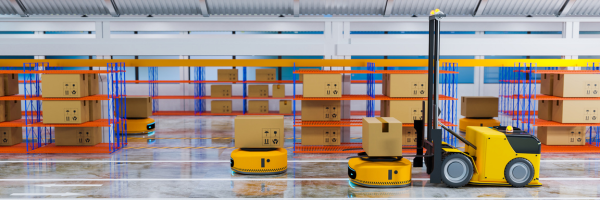The freight forwarding landscape is transforming, driven by cutting-edge innovations that promise to redefine efficiency, sustainability, and overall supply chain performance. With the integration of technologies like the Internet of Things (IoT), Artificial Intelligence (AI), robotics, and blockchain, forwarding companies are embracing a new era of digitalization and automation. Join us as we take a deep dive into the top trends that will revolutionize logistics in the freight forwarding industry in 2024.
IoT and AI Technology for Forwarders
In this digital age, the integration of IoT into logistics and supply chain operations is providing unprecedented visibility and efficiency. Trailblazers are leveraging IoT to manage fleets effectively, offering solutions for fuel management, route optimization, and real-time performance monitoring. Meanwhile, startups are combining Artificial Intelligence of Things (AIoT) and Software as a Service (SaaS) to offer Logistics Operation as a Service (OaaS), facilitating swift digitization and improved efficiency. Such technology can be found in the 7ConNetwork quotation and booking platform. Continued innovations in 2024 will make AI accessible to forwarders within the 7ConNetwork platform.
AI and machine learning algorithms are accelerating logistics by enabling proactive decision-making. Companies are at the forefront of this revolution, providing AI-based software solutions for demand forecasting and price prediction. On the other side of the globe, startups are developing AI-based optimization software that enhances logistics processes, reduces costs, and automates decision-making for fleets over time.

Robotics, Drones and Warehouse Automation
Enter the era of robotics, where integration into logistics processes is redefining speed, accuracy, and overall productivity. Startups specialize in collaborative robots (cobots) that work alongside human workers, picking, placing, and packing goods. Meanwhile, startups are focused on Robotic Process Automation (RPA), automating low-level repetitive tasks and reducing human error.
Addressing challenges like traffic congestion and customer preferences in last-mile delivery, innovations in last-mile delivery are reshaping the logistics landscape. Startups are taking to the skies with drone delivery services for restaurant chains, bypassing traffic congestion and reducing delivery time. Others provide last-mile delivery software for efficient order management, driver dispatch, and real-time tracking.
The heart of logistics operations lies in warehouses, and automated technologies like AGVs and robotic picking systems are optimizing the way they operate. Startups offer AGVs like Dynamo, facilitating the automated transport of goods within warehouses. Others are taking it a step further with systems employing automated storage and retrieval systems (ASRS) to optimize eCommerce warehouses.

Blockchain, Big Data & Analytics, and Cloud Computing
The decentralized ledger system of blockchain is revolutionizing logistics, enhancing security, transparency, and efficiency. Startups simplify payment processes using blockchain's smart contracts, while others build a connected and secure supply chain ecosystem, leveraging blockchain technology to enhance transparency and reduce waste.
Unlocking the power of data, big data and analytics solutions are transforming warehouse operations and logistics processes. Companies lead the charge with AI solutions that reduce fuel consumption and increase efficiency in maritime transport. Others provide prescriptive analytics for inventory planning..
But cloud-based SaaS solutions are what is redefining logistics, offering scalable and cost-effective platforms for freight forwarding. Startups advance cloud logistics, providing warehousing as a service integrated with blockchain technology. Others, like 7ConNetwork, focus on developing a cloud-based transportation management system to meet end-to-end freight forwarding needs.

Keep an Eye Out for Autonomous Vehicles
Safety and efficiency take center stage with the emergence of autonomous vehicles in logistics operations. Startups offer an autonomous utility vehicle fleet, facilitating intelligent and predictable goods transport. Across the globe, startups develop self-driving vehicle software for efficient and safe shipment transport.
Be Flexible in 2024
Flexibility is the name of the game, enabling businesses to adapt operations to fluctuating demand and avoid overcapacity, ultimately reducing costs. Networks like 7ConNetwork offer on-demand freight transport services, connecting freight owners with transporters through a logistics service network. Learn more about gaining flexibility with 7ConNetwork here.
The freight forwarding industry is standing on the cusp of a remarkable transformation, and 2024 will be the year that marks its chapter of revolution. The integration of digitalization and automation, driven by these top trends, will pave the way for a more efficient, sustainable, and technologically advanced future. As freight forwarding companies embrace these groundbreaking innovations, they position themselves to stay ahead of the curve in a rapidly evolving landscape. Join us in embracing the logistics revolution and witness the remarkable advancements that will redefine the industry in 2024 and beyond.